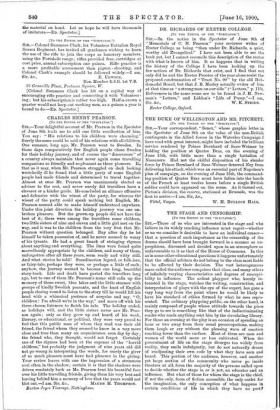CHARLES HENRY PEARSON.
[To THE EDITOR OF THE "SPECTATOR."]
Sin,—Your delightful account of Mr. Pearson in the Spectator of June 9th leads me to add one little recollection of him. You say " His relations to his children were charming." Surely the same could be said of his relations with all children. One summer, long ago, Mr. Pearson went to Sweden. In those days comparatively few English people chose Sweden for their holiday journey, and of course the " discoverers " of a country always maintain that never again come travelling companions so friendly and so pleasant as these pioneers. Be that as it may, when Mr. Pearson struggled on deck looking wretchedly ill he found that a little party of some English people had made friends and determined to travel together. Almost at once Mr. Pearson was unanimously elected as adviser to the rest, and never surely did travellers have a cleverer or a kinder guide. He concluded an alliance offensive and defensive with the wisest of the party, for whereas the wisest of the party could speak nothing but English, Mr. Pearson seemed able to make himself understood anywhere. Under this joint direction the holiday journey was one un- broken pleasure. But the grown-up people did not have the best of it; there were among the travellers some children, two little sisters of nine and eleven and a little girl met on the way, and it was to the children from the very first that Mr. Pearson without question belonged. Day after day he let himself be taken possession of, and he never seemed to weary of his tyrants. He had a great knack of stringing rhymes about anything and everything. The lines were found quite marvellously appropriate by the children, and many of them, unforgotten after all these years, seem ready and witty still. And what stories he told! Scandinavian legend, or folk-lore, or fairy-tale, perhaps they were, or perhaps a little of each; anyhow, the journey seemed to become one long, beautiful story-book. Life and death have parted the travellers long ago, but to one of them Mr. Pearson's name still calls up the memory of those sweet, blue lakes and the little steamer with groups of kindly Swedish peasants, and the knot of English people closing round to listen to the story till he would lift his head with a whimsical pretence of surprise and say, "0, children ! rm afraid we're in the way," and move off with his three chosen listeners to finish his tale. The holiday ended, as holidays will, and the little sisters never saw Mr. Pear- son again ; only as they grew up and heard of his work, literary, or educational, or political, they were very proud to feel that this public man of whom they read was their old friend, the friend whom they seemed to know in a way more close and true than many an acquaintance seen day by day ; the friend who, they thought, would not forget. Certainly one of the rhymes had been at the expense of the "horrid children," but probably the judgment of nine years old did not go wrong in interpreting the words, for surely the giver of so much pleasure must have had pleasure in the giving. Your review leaves with one the impression of a strenuous soul often in the shadow; certain it is that the shadows were driven resolutely back as Mr. Pearson bent his beautiful face over his little travelling friends, giving them his very best and leaving behind him a memory of love that the years would not






































 Previous page
Previous page